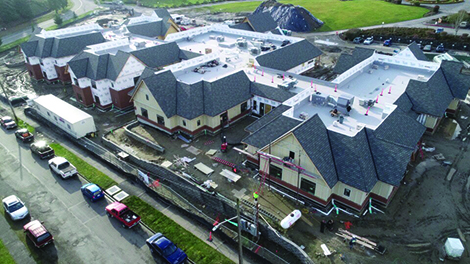Healthy lawns and environment (naturally)
You can have your grass and be kind to the environment, too. Just go natural.
As pointed out by the City of Tacoma’s Environmental Services Department, whose work involves ways of helping neighborhoods and Puget Sound thrive, a healthy lawn is not only pleasing to the eye, but also eco-friendly with the right kind of mowing, watering and fertilizing. It happens through natural lawncare, which includes building healthy soil, smart uses of water, and reducing, if not eliminating chemical pesticides and fertilizers.
For instance, think of the lawn mower as a fertilizer machine. When mowing, leave the grass clippings on the lawn. A season’s worth of clippings equals one fertilizer application. They add water, nutrients and organic matter to the soil. The same is true for mulching soil with shredded leaves, evergreen needles or woodchips that help conserve moisture, suppress weeds and improve the soil. At the same time, always sweep grass clippings and any fertilizer residue off walkways and driveways. This simple step keeps unwanted nutrients from draining into waterways.
Protecting water is a key way that virtually everyone can be environmental stewards while maintaining their yards. Stormwater runoff from homes is a potential source of pollution in Tacoma’s Commencement Bay and Puget Sound, so it’s no wonder that marine water, rivers, lakes and groundwater are healthier when the use of chemicals is reduced and yard trimmings are recycled into free fertilizer.
Environmental Services has another suggestion for being natural—namely, the City of Tacoma’s Tagro line of nutrient-rich soil that’s made from biosolids harvested from the city’s wastewater treatment system. It’s highly rated as safe and effective by the U.S. Environmental Protection Agency and is available for order by calling the city at 253-502-2150. Its benefits for yards and the environment include:
- Nutrients are released slowly. Plants use more of the nutrients and fewer are leached or carried away in water runoff into the environment.
- Tagro-conditioned soil does a better job of retaining water. The more water the soil retains, the less watering by hose or sprinkler is necessary, which results in more natural water flowing into rivers and streams.
- Plants and trees thrive, providing shade and less soil erosion near creeks and rivers, making the water healthier for fish and people.
Speaking of water, efficient watering systems for yards can be seen in action at EnviroHouse, a City of Tacoma project that showcases green building and natural-landscaping methods. Exhibits include a fully integrated rainwater management system that funnels rainwater from roof gutters into rain barrels that are linked to provide water for use in the yard. The water-efficient system features low-evaporation spray heads and drip irrigation that applies water directly to roots to greatly reduce wasteful runoff, another plus for the environment. You can see the system up close at 3510 S. Mullen St., where EnviroHouse is open to the public Wednesday through Friday from 10 a.m. to 3 p.m. and on weekends from 11 a.m. to 5 p.m. Its phone number is 253-573-2425.
Finally, weeds are the unwanted guests of lawns. But try not to evict them at the expense of environmental health. Dig or pull them out, roots and all. This is way more time-consuming and taxing physically than using herbicides, but it’s the most environmentally friendly method.

